Nutrition info of Banana -Ideal for Good Health
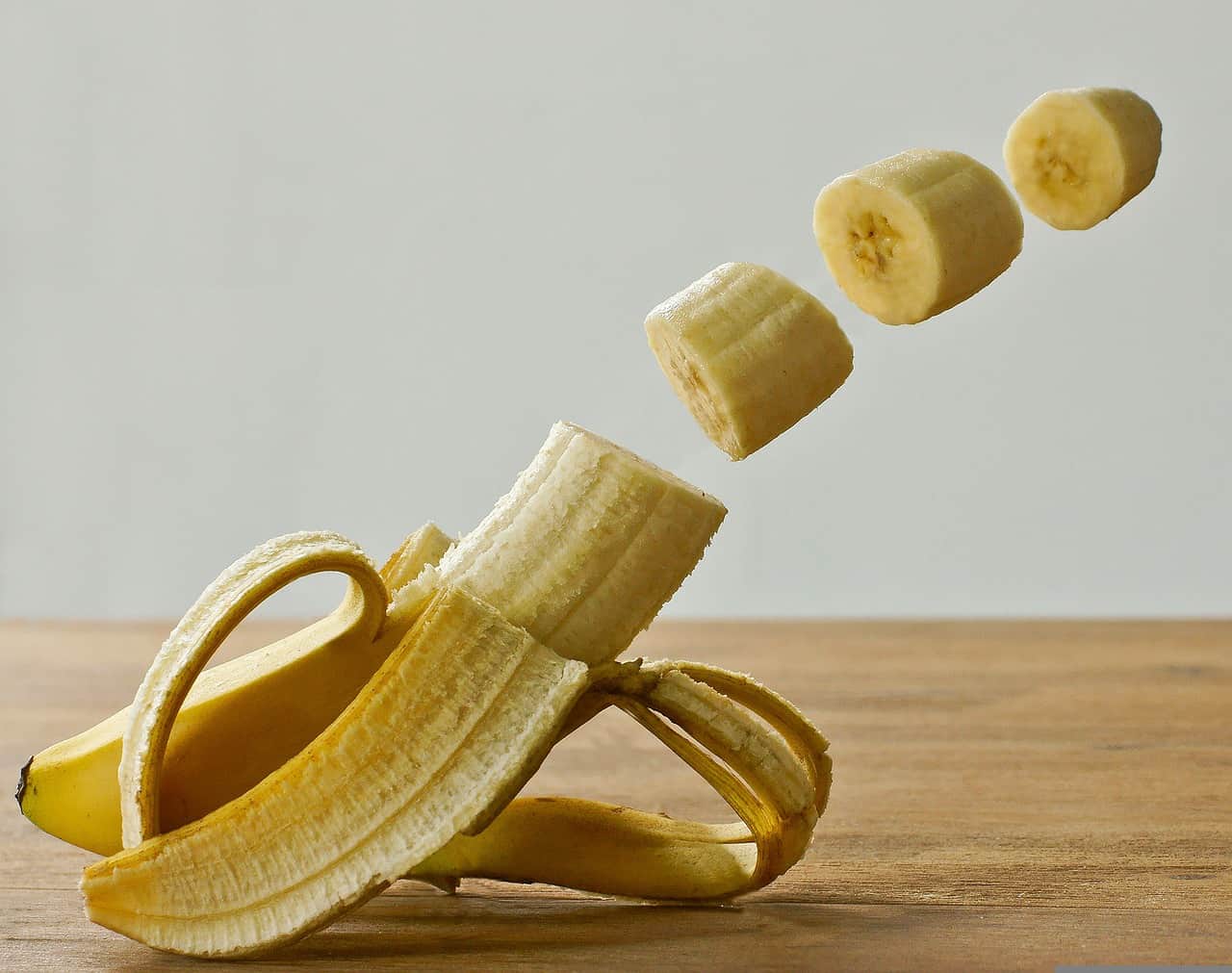
Nutrition info of Banana
Bananas are highly cherished among the global population. This fruit contains vital nutrients that help protect the person and their environment. There is research that shows that consuming bananas can lower blood pressure and decrease the possibility of developing cancer. This article will explore some of the nutrition info of bananas and the health advantages that someone may receive if they consume bananas, including increased heart health and regularity.
Bananas are a significant nutritional foundation. The plant mainly belongs to the family of types native to Asia that prosper in the balmier parts of the world, derived from South East Asia. Bananas possess plenty of wholesome sources of roughage and vitamins. Nearly any size can be employed. Generally, they come in green and yellow, although certain varieties may be red.
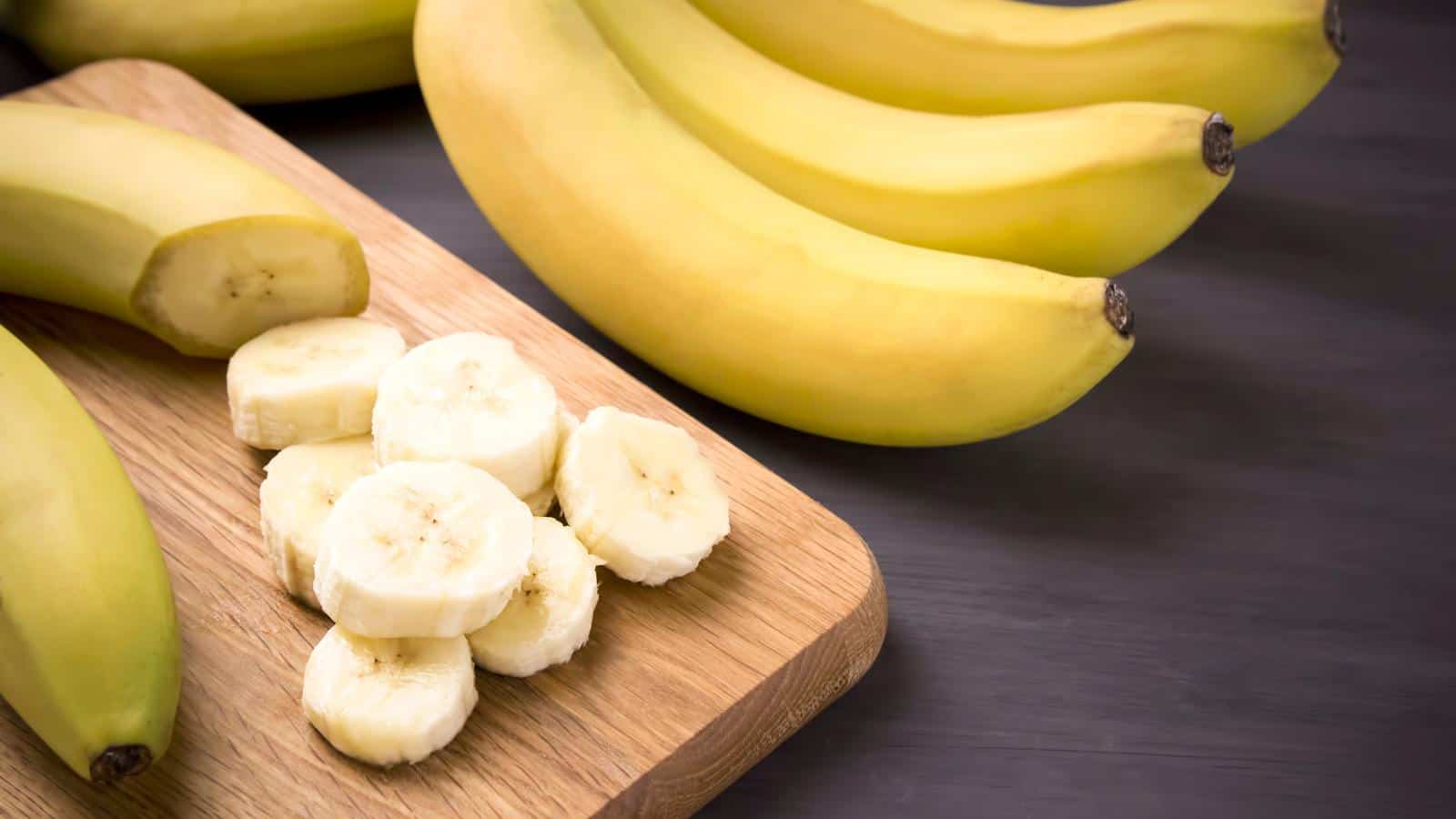
Do bananas have a high glycaemic index?
Bananas are a popular fruit that many people enjoy for their sweet taste and nutritional benefits. But do they have a high glycaemic index? The answer is no. The Glycaemic index (GI) is a measure of the rise in blood sugar levels after eating a particular food. A GI score of 55 or less is rated as low, meaning that the food will not raise blood sugar significantly. Bananas have a low GI of 51 when ripe, and even lower at 42 when slightly under-ripe.
The glycaemic load (GL) is another important measure to consider when assessing the impact of food on blood sugar levels. It takes into account not only the glycaemic index but also factors in the number of carbohydrates in one serving of that food. A GL score of 10 or less is considered low, and bananas have moderate GL scores of 13 and 11 respectively for ripe and under-ripe bananas. So while bananas may be higher in carbohydrates than some other fruits, their low GI and moderate GL scores make them an ideal choice for those looking to maintain healthy blood sugar levels.
Nutrition info of Banana – facts
The nutritional value facts for one medium-sized banana (100 grams) are:
Calories: 105
Water: 75%
Protein: 1.3 g
Carbs: 27 g
Sugar: 14.4 g
Fibre: 3.1 g
Fat: 0.4 g
Sodium: 1.2mg
Potassium: 422mg
Vitamin C: 10.3mg
Banana Carbs
Bananas are among the most favoured fruits in the world, renowned for their sweetness and mushy texture. They additionally provide a great amount of carbs – each banana contains roughly 27 grams of carbohydrates making it an ideal snack before exercise, or fast energy supplement.
Bananas are so delightful because of the majority of sugar that is held in their carbs. But this sugar quickly changes over to energy when taken by the body, making bananas an exceptional alternative for a bite on-the-go. Thus, instead of basic candy bar next time you glance for a speedy jump start, go for a banana. You will have a scrumptious treat as well as a beneficial dose of carbohydrates.
Banana Fats
Bananas are also relatively high in fat, with 75% of calories they contain coming from fat. It’s noteworthy that most of this fat is comprised of healthy unsaturated fats.
Not only does this type of fat aid in heart health by lowering cholesterol levels, but bananas also provide other nutrients like potassium and fibre that are beneficial for the heart.
Despite being high in fat, bananas are still nutrient-rich and can help maintain a healthy diet.
Protein in Banana
Not only are bananas a fantastic source of protein, they actually have all the amino acids that our bodies need to construct and mend muscle fibres. Consuming just one banana provides you with 10% of your body’s everyday protein needs – making it a great snack for athletes or anyone striving to define their muscles.
Bananas are low in calories and fat, so you can snack on them guilt-free. Also, they’re a great source of protein and other important nutrients, making them the perfect healthy snack.
Vitamins and Minerals in Bananas
Bananas have high nutritional value, being rich in vitamins and minerals like potassium, vitamin C, and vitamin B6. They also supply small amounts of magnesium, manganese, and dietary fibre.
Many of the beneficial components in bananas are located in the skin or covering. Yet, the edible part of this fruit is also a great source of essential vitamins and minerals. Bananas are fairly energy-rich, so it may not be best for those attempting to slim down. Nevertheless, it is a nutritious food that can be enjoyed as a part of a balanced diet.
Calories and bananas
A single medium banana contains around 105 calories, which are mainly sourced from carbohydrates and only a minimal amount from fat and protein. Bananas are also rich in dietary fibre, helping users feel full for longer as well as potentially aiding weight loss.
Bananas are loaded with beneficial nutrients like potassium and vitamin C, which are vital for promoting bone and heart health. Despite being healthy, these fruits also contain a lot of sugar, so it’s suggested to eat them in moderation as part of an overall balanced diet.
Magnesium
Bananas are an excellent source of magnesium, an important nutrient that helps muscles and nerves to function correctly.
Potassium
Bananas are a good source of potassium, which is important for maintaining proper fluid balance in the body.
Vitamin C
Bananas are a good source of vitamin C, which is an antioxidant that helps protect the body against damage from free radicals.
Vitamin B6
Bananas are good sources of vitamin B6, which is necessary for proper cell function and helps the body, metabolize proteins.
Fibre
Bananas are a good source of fibre, which can help you lose weight.
Banana fibres increase gut health and help to keep the digestive system running smoothly.
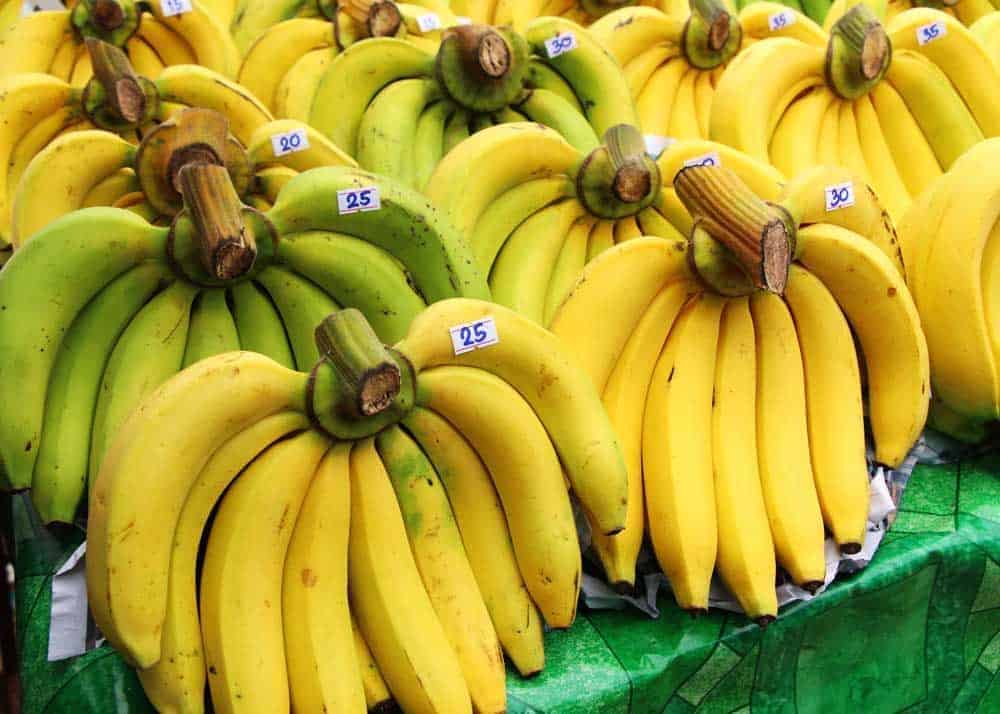
Other beneficial compounds
Bananas are a great source of many beneficial plant compounds that can help improve our health. Fruits and vegetables contain numerous types of bioactive plant compounds, and bananas are no exception. One such compound is dopamine, which acts as an antioxidant and has been linked to a reduced risk of heart disease. However, it does not cross the blood-brain barrier to affect mood like it does in the brain.
Another important compound found in bananas is catechin, which is a type of antioxidant flavonoid. Studies have shown that catechins may help reduce the risk of heart disease by protecting against oxidative damage caused by free radicals. Additionally, they can also help reduce inflammation and boost immunity. Like other fruits, bananas contain several healthy antioxidants that are responsible for many of their health benefits. Eating a banana every day can provide your body with essential nutrients and beneficial plant compounds that can help keep you healthy and strong.
Improves Diabetes Management
Diabetes is a condition that makes it difficult for the body to control blood sugar levels, and while there is no known cure, managing it effectively can alleviate symptoms and lower the risk of complications.
As part of a healthy diabetes diet, bananas can be beneficial. They provide dietary fibre which helps regulate blood sugar and green banana flour contributes to improved insulin sensitivity, weight loss, and decreased liver and kidney issues linked to diabetes.
Furthermore, bananas possess potassium which can aid in decreasing blood pressure. It is critical for those with diabetes to collaborate with a healthcare provider to design a customized meal plan that caters to their individual needs. Adding bananas as part of an overall balanced diet can help maintain blood sugar levels and control diabetes.
Bananas Promote regularity and support digestive health
Eating bananas may be beneficial for digestive health. Bananas are a good source of dietary fibre, with one medium-sized banana providing about 3 grams of fibre. This type of fibre is important for promoting regularity and preventing constipation. Additionally, unripe bananas contain resistant starch, which is prebiotic that helps feed the beneficial bacteria in your gut. Pectin, a type of fibre found in both ripe and unripe bananas, may also help soften stools and prevent constipation.
Furthermore, some test-tube studies suggest that pectin may even have protective effects against colon cancer. However, more research on humans is needed to confirm this benefit. Overall, eating bananas can be an easy way to support digestive health due to their high fibre content and potential prebiotic benefits.
Eating bananas can help reduce blood pressure.
Bananas are full of potassium, which is important to manage healthy blood pressure. Potassium helps eliminate extra sodium, which can cause an increase in blood pressure.
Bananas are also rich in magnesium, an essential mineral for proper muscle and nerve functioning. Magnesium helps relax blood vessels and can help keep high blood pressure at bay.
Eating bananas is a healthy way to incorporate nutrition into your diet.
May Assist Wound Healing
Bananas are useful for aiding wound healing due to their high levels of vitamins and minerals, such as Vitamin C, potassium, and magnesium, all of which are vital for the healing process.
Additionally, bananas contain anti-inflammatory protease inhibitors and polyphenols which can help fight infection. Moreover, the flesh of bananas is soft and easy to mash, making them ideal for use on wounds.
Moreover, the substantial moisture in bananas can help to keep wounds lubricated and therefore promote healing. Therefore, there is good reason to think that bananas might be beneficial when trying to heal a wound.
Eating Bananas Can Help You Lose Weight
Bananas are an outstanding source of fibre, which can help with shedding extra pounds. Fibre is proven to hold one feeling full for longer and stop overeating. Bananas are also reduced in calories and do not include any fat. This renders them a great pick for people looking to lose weight. Unripe bananas are packed with an element called resistant starch – which behaves similarly to insoluble fibre; the type that can lend a hand to keep your intestines working optimally.
Resistant starch helps reduce blood sugar levels. Additionally, high-fibre foods make you feel full without adding any extra calories; this makes them an excellent option if you’re trying to lose weight.
Eating bananas as part of a balanced diet is good for your health. But keep in mind that they contain a high amount of sugar and calories. If you are worried about weight management or blood sugar levels, it’s best to talk to your doctor before you include bananas in your diet.
Varieties of nutritious bananas
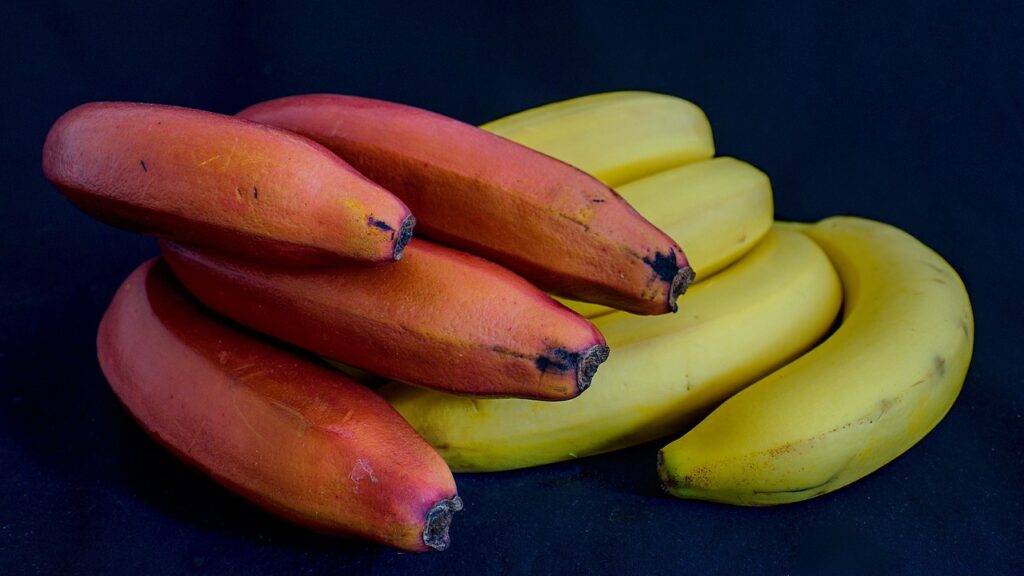
A tremendous variety of bananas are grown all around the world – over 1000 to be exact. Musa Cavendish is primary amongst these varieties and makes up for an impressive 45 per cent of global banana exports, gaining immense popularity with consumers. Plantains alone make up almost 100 kinds in the comprehensive category. Various banana types can be discovered at regular supermarkets and stores providing specialty goods. Immerse yourself in the different banana kinds for a fuller understanding of this time-honoured fruit.
There are numerous types of bananas, including:
Cavendish
The type of banana most frequently seen in supermarkets is this kind.
Red bananas
Compared to Cavendish bananas, these are smaller and sweeter. They have red or purple peels and are popularly used in baking.
Plantains
Plantains are generally bigger and starchier than Cavendish bananas. They may need to be cooked prior to eating.
Baby bananas
The smaller and sweeter than Cavendish bananas are great for baking, or simply as a snack.
Possible Allergies from bananas
Specific allergic reactions to bananas can occur, even though they are not common. People with oral allergy syndrome (OAS) may have symptoms when consuming foods like apples and bananas because the allergen from pollen is absorbed into them. Additionally, those who suffer from a banana allergy are also known to be sensitive to rubber latex. A current study discovered that half of all people with a latex allergy also eat bananas.
An allergy can cause hives, nausea, vertigo, trouble breathing, or even anaphylaxis. Even though not extensively studied, severe pancreatitis is a bacterial infection triggered by the consumption of bananas. If you think your allergic reaction was caused by eating a banana, refrain from using any at all. Signs of having a banana allergy range from swelling or itching around the throat and lips to having difficulty in breathing. In more severe cases, anaphylaxis could be present.
What are the best times to buy bananas?
Buying green bananas gives you the ability to ripen them as desired. Furthermore, readily and freshly available banana products can be bought at any store throughout the year.
The best time to purchase bananas is when they are in season, though you can always find ripe bananas in supermarkets or farmers’ markets throughout the year.
What is the optimal time for eating bananas?
Bananas are a delicious part of any balanced diet and they can offer extra benefits when eaten at the right time.
For instance, munching on a banana before a workout can give you vigour and keep you hydrated. Eating a banana afterwards can help to top up your electrolytes and restore your glycogen.
Eating a banana before going to bed can be beneficial. The magnesium content of bananas can aid relaxation while the potassium can promote sleep.
Storage and Food Safety
Bananas stored at room temperature, away from direct sunlight will stay good the longest. Even if you store them in the refrigerator, they may become mushy.
It is best to consume a ripe banana within a couple of days. Bananas with brown spots or turning brown are still safe to eat and not necessarily overripe. Contrary to popular belief, these bananas can still be consumed.
Bananas are harvested while still green and then sent to stores where they naturally become ripe. Once the bananas start to turn brown, they reach their peak flavor. If they become too ripe, though, they will turn mushy and develop black spots.
Bananas with black spots are still edible but may taste worse than ripe ones. When storing them, keep them in a room temperature environment; refrigerating them will make them turn brown faster.
To slow down the ripening process and prevent browning, you can wrap the stems of your bananas in plastic wrap. Additionally, if you’ve already cut up a banana, you can stop it from turning brown by adding lemon juice or vinegar to it.
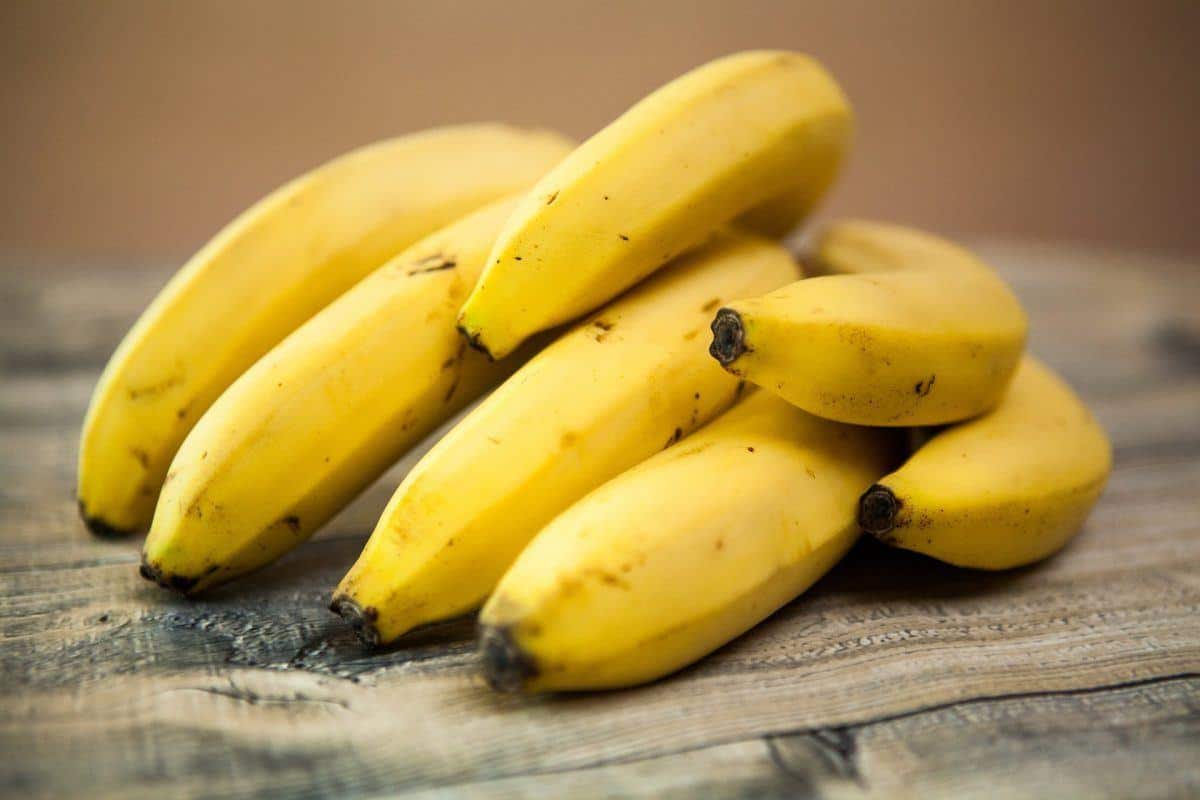
Learning about the nutrient contents in bananas and different ways to enjoy them.
Bananas are not only tasty but also very healthy. One of the simplest ways to enjoy this fruit is to peel it and have it as a snack. Their natural sweetness and creamy texture make them a favourite for many people.
Bananas can be added to cereal or oatmeal, pureed and substituted for butter in recipes while baking, grilled as a savoury side dish, or simply enjoyed mashed – no matter how you decide to eat them they make a healthy treat.
Bananas are great for baking, like in banana bread or muffins. Plus, adding bananas to smoothies or shakes is a must.
If you’re in the need of a healthy snack, grab yourself a banana! There are numerous ways to enjoy this yummy fruit.
Are banana peels edible?
Banana peels can create slippery surfaces, but the fruit itself is not poisonous. Bananas are edible and chock-full of healthy nutrients. They are popular worldwide, although they are not largely consumed in western countries,” Flores said. Loaded with vitamins B5, B7, magnesium, potassium, fibres, and proteins, banana peels hold a number of bioactive compounds like carotenoids and polyphenolic compounds, Flores wrote in 2011.
Bananas: did you know
Bananas and plantains are not only delicious fruits but their leaves can also be recycled for a variety of uses. In many countries, banana and plantain leaves are used as wrappers to hold tamales and meats. This helps to seal in flavour while cooking. Additionally, the inside of banana peels has long been used in traditional and folk medicine as an antiseptic and anti-inflammatory to promote wound healing such as for bug bites, minor burns, and sunburns. The peel is pressed on a wound for several minutes as a simple home remedy.
The potential health benefits of bananas don’t stop there. Research has shown that banana peels contain plant chemicals in the form of antioxidants which may help protect against certain diseases. A study published in the Journal of Lipid Research found that short-chain fatty acids produced by gut bacteria from the dietary fibre found in bananas may play an important role in regulating host energy metabolism. These findings suggest that eating bananas could provide health benefits beyond just essential nutrients like potassium and vitamin B6.
Nutrition info of Banana: Conclusion
Bananas are healthy and delicious fruit that can be enjoyed in many different ways. From being eaten as a snack to being used in baking or smoothies, there are endless possibilities when it comes to enjoying this versatile fruit. And not to worry, banana peels are edible and pose no risk of slipping on. So go ahead and enjoy a banana today!
Frequently asked questions about bananas
What are the advantages of eating bananas for health?
Eating bananas offers many health advantages and provides a balanced nutritional profile. Blood glucose levels rise when eating bananas. They are easily digested and can help prevent weight gain or sustain an ideal weight. Bananas are an ideal way to maintain healthy blood sugar levels. Containing antioxidants, bananas can possibly grant increased energy levels as well. Consuming bananas can improve glucose tolerance once an individual has reached peak maturity.
Is eating a banana a day good for you?
It contains essential nutrients, and too many calories can be harmful, but I don’t think so. Too much can lead to weight gain or nutritional deficiencies.
How can I keep my banana from turning brown?
There are a few ways to prevent bananas from turning brown. One way is to wrap the stems in plastic wrap. This will help to slow down the ripening process. Another way is to add lemon juice or apple cider vinegar to the fruit. This will help to keep the banana from turning brown.
Nutrition info of Banana: References
Potassium.Bananas are a good source of potassium. A diet high in potassium can lower blood pressure in people with elevated levels and benefits heart health
External Link: https://www.ncbi.nlm.nih.gov/pubmed/21371638
Catechin.Several antioxidant flavonoids are found in bananas, most notably catechins. They have been linked to various health benefits, including a reduced risk of heart disease
External Link: http://www.sciencedirect.com/science/article/pii/S0308814602001863
Together, these two types of fiber may moderate your blood sugar levels after meals.
Plus, they may help regulate your appetite by slowing the emptying of your stomach
External Link: https://pubmed.ncbi.nlm.nih.gov/25129656/
The American Diabetes Association recommend eating bananas and other fruit as they contain fiber.
They note that eating fiber can help lower blood sugar levels.
Anchor Text: note
External Link: https://www.diabetes.org/nutrition/understanding-carbs/get-to-know-carbs
Bananas have a relatively low glycemic index (GI) of 42–58, depending on their ripeness. The GI is a measure of how quickly carbs in food enter your bloodstream and raise blood sugar.
External Link: http://glycemicindex.com/
*** More great articles that may be of interest to you 🙂
